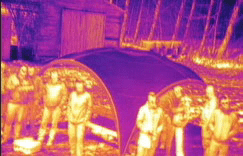
Sponsored Content. Part 107 opened the portals for commercial drone operators. But faced with growing competition, many small drone operators struggle to find a profitable niche in the commercial industry. That’s why it might be worth the trouble to apply for a night ops waiver.
Night ops are currently the most commonly granted waiver- they are easy for the FAA to grant, with proven equipment and a predictable safety framework. But a night ops waiver isn’t just about being able to film evening weddings or take nighttime beauty shots. Combine the waiver with a moderate investment in some powerful thermographic equipment, and drone operators have a desirable – and profitable – niche.
Night operations are not just about search and rescue, although the benefits there are enormous. Thermographic equipment for industrial applications is often best used at night, when the sun is not contributing to surface heat. Roofing inspections, for example, where thermographic and radiometric equipment can identify a potential leak instantly, are an application where drones offer a significant ROI over doing the work with a person on the roof; and are better performed at night.
Thermal imaging company FLIR, the experts in thermographic equipment for drones, say that daylight is no longer necessary for safe flight. “You don’t need different equipment to fly at night,” says Jay James, FLIR’s VP Worldwide Sales. “With thermal imaging it doesn’t matter – you aren’t restricted to needing to ‘see’ during the day.” That ability to see means that operators with a night ops waiver have a unique advantage in working with law enforcement or insurance companies who need to document accident scenes – most of which occur at night. And some clients, such as business offices open during the day, simply prefer that drone activity take place at night when the site is less populated.
Industrial and public sector clients are more likely to offer repeat business to operators with specialized equipment and licensing, and the ability to work at any hour of the day adds a major benefit to your offering. If your business is trying to move into the commercial realm, a night ops waiver might be the way to start.
Miriam McNabb is the Editor-in-Chief of DRONELIFE and CEO of JobForDrones, a professional drone services marketplace, and a fascinated observer of the emerging drone industry and the regulatory environment for drones. Miriam has penned over 3,000 articles focused on the commercial drone space and is an international speaker and recognized figure in the industry. Miriam has a degree from the University of Chicago and over 20 years of experience in high tech sales and marketing for new technologies.
For drone industry consulting or writing, Email Miriam.
TWITTER:@spaldingbarker
Subscribe to DroneLife here.